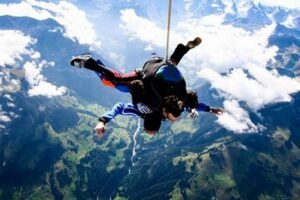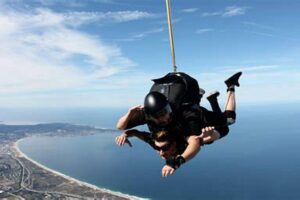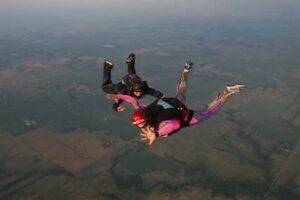Table of Contents
Skydiving is an activity where people jump from an airplane with a parachute. The age at which one can do skydiving varies depending on the regulations of the particular country or jurisdiction.
Skydiving is a popular activity for thrill-seekers and adventurers. It offers a unique and exhilarating experience with benefits such as improved self-confidence and stress relief. The development of modern parachutes in the 1950s made skydiving more accessible and safer, leading to its growth as a recreational activity.
This article will provide further information on the age requirements for skydiving, including legal restrictions, recommended ages, and considerations for minors.
How Old Do I Have to Be to Skydive?
Skydiving is an exhilarating activity that requires careful consideration of various factors, including age restrictions. Understanding the essential aspects related to age requirements is crucial for ensuring a safe and enjoyable experience.
- Legal Age: Varies by jurisdiction, typically 18-21 years old
- Parental Consent: Minors may require parental consent
- Physical Fitness: Requires good overall health and fitness
- Mental Readiness: Involves psychological preparation and emotional stability
- Training and Certification: Proper training and certification are essential
- Weather Conditions: Age restrictions may be affected by weather conditions
- Insurance: Skydiving insurance may have age-related requirements
These aspects are interconnected and play a vital role in determining the appropriate age for skydiving. For instance, while the legal age sets the minimum requirement, parental consent ensures that minors have the maturity and support necessary for this activity. Physical fitness and mental readiness are crucial for handling the physical and emotional demands of skydiving. Furthermore, proper training and certification provide the knowledge and skills needed for a safe jump. Understanding these aspects helps ensure that individuals are adequately prepared and meet the necessary criteria for skydiving.
Legal Age
The legal age to skydive varies depending on the jurisdiction. In most countries, the minimum age is 18 years old, while some countries allow skydiving from 16 or 17 years old with parental consent. This variation in legal age reflects the differing perspectives on the maturity, risk tolerance, and legal responsibilities of minors in different jurisdictions.
- Minimum Age: The minimum age to skydive is typically 18 years old, as this is considered the age of majority in many countries. At this age, individuals are generally considered to have the legal capacity to make decisions about their own safety and well-being.
- Parental Consent: In some countries, minors below the age of 18 may be allowed to skydive with the consent of their parents or legal guardians. This reflects the recognition that parents have a responsibility to protect their children and make decisions in their best interests.
- Jurisdictional Differences: The legal age to skydive varies from country to country. For instance, in the United States, the minimum age is typically 18, while in Canada, it is 16 with parental consent. These differences highlight the varying approaches to regulating skydiving and the legal rights of minors.
- Insurance Considerations: Insurance companies may have their own age restrictions for skydiving. Some insurance policies may exclude coverage for minors or require additional premiums. This is because minors are generally considered to be at a higher risk of injury or accident.
Understanding the legal age requirements for skydiving in different jurisdictions is essential for ensuring compliance with the law and mitigating potential legal liabilities. It is advisable to check with local skydiving operators and authorities to determine the specific age requirements and any additional regulations that may apply.
Parental Consent
The connection between “Parental Consent: Minors may require parental consent” and “how old do I have to be to skydive” lies in the legal and ethical considerations surrounding minors engaging in high-risk activities. Parental consent serves as a critical component of skydiving regulations, ensuring that minors have the necessary maturity, understanding, and support to participate safely.
In many jurisdictions, skydiving is considered a legal activity for minors with parental consent. This reflects the recognition that parents have a primary responsibility for the safety and well-being of their children. By requiring parental consent, skydiving operators and authorities can ensure that minors are adequately supervised and have the necessary permissions before engaging in this potentially hazardous activity.
Real-life examples of parental consent in skydiving include:
- A 16-year-old seeking to skydive must obtain written consent from a parent or legal guardian before being allowed to participate.
- Skydiving schools may require minors to complete a parental consent form that outlines the risks and responsibilities involved in the activity.
- Parents may accompany their minor children on skydiving jumps to provide additional support and supervision.
Understanding the practical applications of parental consent in skydiving is essential for both minors and their parents. By adhering to these regulations, minors can ensure that they are meeting the legal requirements and taking the necessary steps to participate safely in skydiving. Parents, in turn, can fulfill their duty of care by providing informed consent and ensuring that their children are adequately prepared for the risks involved.
In conclusion, parental consent plays a vital role in regulating skydiving for minors. It serves as a legal and ethical safeguard, ensuring that minors have the necessary maturity, understanding, and support to participate safely in this high-risk activity. By requiring parental consent, skydiving operators and authorities can help protect minors and promote responsible decision-making.
Physical Fitness
Assessing physical fitness is a crucial aspect of determining an individual’s suitability for skydiving, particularly in conjunction with age considerations. Skydiving places unique demands on the body, and good overall health and fitness are essential for ensuring a safe and enjoyable experience.
- Cardiovascular Health: Skydiving involves sudden changes in altitude and air pressure, which can strain the heart and lungs. Good cardiovascular health ensures that the body can adapt and respond effectively to these demands.
- Musculoskeletal Fitness: Skydiving requires strength and coordination to control body position and withstand the forces of the jump. Adequate musculoskeletal fitness helps prevent injuries and enhances the overall skydiving experience.
- Flexibility: Skydivers need to be able to move freely and react quickly in the air. Good flexibility allows for proper body positioning and reduces the risk of muscle strains or injuries.
- Balance and Coordination: Skydivers must maintain balance and control their body movements throughout the jump. Good balance and coordination ensure stability and enhance the overall safety and enjoyment of the activity.
Understanding the physical fitness requirements for skydiving is essential for both aspiring skydivers and those assessing the suitability of minors. By considering these factors in conjunction with age-related considerations, individuals can make informed decisions about their participation in this exhilarating activity.
Mental Readiness
Mental readiness is a critical component of skydiving, encompassing psychological preparation and emotional stability. Skydiving involves inherent risks and challenges that require individuals to be mentally prepared and emotionally stable to make sound decisions and respond effectively to unexpected situations. Understanding the connection between mental readiness and skydiving is essential for assessing an individual’s suitability for this activity, especially in conjunction with age considerations.
Psychological preparation involves developing the cognitive skills and mental fortitude necessary for skydiving. This includes understanding the risks involved, developing coping mechanisms for fear and anxiety, and practicing decision-making under pressure. Emotional stability refers to the ability to manage emotions, stay calm under stress, and maintain focus and concentration throughout the skydiving experience.
Real-life examples of mental readiness in skydiving include:
- Skydivers undergoing training to develop the psychological skills and knowledge required for safe and successful jumps.
- Experienced skydivers using visualization techniques to mentally prepare for challenging jumps or to overcome fear and anxiety.
- Skydiving instructors assessing the mental readiness of students before allowing them to participate in solo jumps.
Understanding the practical applications of mental readiness in skydiving is crucial for both aspiring skydivers and those assessing the suitability of minors. By considering these factors in conjunction with age-related considerations, individuals can make informed decisions about their participation in this exhilarating activity.
Training and Certification
Within the context of “how old do I have to be to skydive,” training and certification play a pivotal role in ensuring a safe and enjoyable experience. Formal training and certification provide the necessary knowledge, skills, and preparation for individuals to engage in skydiving responsibly and competently.
- Theoretical Knowledge: Skydiving training involves thorough instruction in the principles of skydiving, including aerodynamics, equipment usage, and emergency procedures. This knowledge equips individuals with a comprehensive understanding of the activity and its potential risks.
- Practical Skills: Through supervised jumps and practice, skydivers develop essential practical skills, such as body control, parachute deployment, and landing techniques. These skills enable them to navigate the various phases of a skydive safely and effectively.
- Safety Procedures: Training emphasizes safety protocols, including equipment checks, weather assessment, and communication techniques. By adhering to these procedures, skydivers minimize risks and enhance their overall safety during the activity.
- Certification Levels: Skydiving certifications are typically progressive, requiring individuals to demonstrate proficiency at different levels before advancing to more challenging jumps. This structured approach ensures a gradual progression of skills and experience, catering to skydivers of varying abilities.
Proper training and certification are not only essential for ensuring the safety of skydivers but also for meeting legal requirements and industry standards. By completing accredited training programs and obtaining recognized certifications, individuals demonstrate their competence and commitment to responsible skydiving practices.
Weather Conditions
Weather conditions play a crucial role in determining the suitability of skydiving for individuals of different ages. Adverse weather conditions can pose additional risks and challenges, influencing the minimum age requirements and safety considerations for skydiving.
- Wind Speed: High wind speeds can affect the stability and control of the parachute, making it more difficult to land safely. Age restrictions may be imposed to ensure that younger individuals have the physical strength and coordination to handle challenging wind conditions.
- Visibility: Poor visibility due to fog, clouds, or precipitation can impair the skydiver’s ability to navigate and make safe landings. Age restrictions may be adjusted to ensure that younger individuals have the maturity and judgment to make sound decisions in low-visibility conditions.
- Temperature: Extreme temperatures, both hot and cold, can affect the skydiver’s physical well-being and equipment performance. Age restrictions may be considered to ensure that younger individuals have the physical endurance and appropriate clothing to withstand extreme temperatures.
- Thunderstorms and Lightning: The presence of thunderstorms and lightning poses significant safety risks due to turbulence, wind shear, and electrical hazards. Skydiving operations may be suspended or age restrictions imposed to minimize the exposure of younger individuals to these hazardous conditions.
Understanding the impact of weather conditions on age restrictions for skydiving is essential for ensuring the safety and well-being of participants. By considering these factors, skydiving operators and authorities can make informed decisions about the minimum age requirements and any necessary adjustments based on the prevailing weather conditions.
Insurance
Understanding the insurance landscape for skydiving is integral to addressing the question of “how old do I have to be to skydive.” Insurance policies may impose age-related requirements to mitigate risks and ensure the safety of participants.
- Minimum Age Limits: Insurance companies may establish minimum age limits for skydiving coverage. These limits reflect the higher risks associated with younger individuals, who may have less experience and maturity to handle potential emergencies.
- Parental Consent: For minors seeking skydiving insurance, parental consent may be required. This requirement ensures that parents are aware of the risks involved and have authorized their child’s participation in the activity.
- Higher Premiums: Younger skydivers may face higher insurance premiums due to their perceived higher risk profile. Insurance companies may adjust premiums based on factors such as age, experience, and training.
- Exclusion of Coverage: In some cases, insurance policies may exclude coverage for skydiving altogether, regardless of age. This highlights the inherent risks associated with the activity and the need for participants to carefully consider their insurance options.
These age-related insurance requirements underscore the importance of responsible decision-making and the need for individuals to assess their suitability for skydiving based on their age, experience, and risk tolerance. By understanding the insurance implications, individuals can make informed choices and ensure that they have adequate coverage in the event of an incident.
Frequently Asked Questions
This section addresses frequently asked questions related to age restrictions and skydiving, providing concise and informative answers to common concerns or misconceptions.
Question 1: What is the minimum age to skydive?
The minimum age to skydive varies depending on the jurisdiction and skydiving operator, but it typically ranges from 16 to 18 years old.
Question 2: Is parental consent required for minors to skydive?
Yes, in many jurisdictions, minors under the age of 18 require written consent from a parent or legal guardian to participate in skydiving activities.
Question 3: Are there any physical fitness requirements for skydiving?
Yes, skydiving requires good overall health and fitness, including cardiovascular health, musculoskeletal fitness, flexibility, and balance. It is advisable to consult with a healthcare professional before engaging in skydiving to ensure physical suitability.
Question 4: What are the weather conditions that may affect age restrictions for skydiving?
Adverse weather conditions such as high wind speeds, poor visibility, extreme temperatures, and thunderstorms can impact age restrictions for skydiving. Operators may impose stricter age limits or suspend operations altogether under such conditions.
Question 5: Does skydiving insurance have age-related requirements?
Yes, some skydiving insurance policies may have minimum age limits or adjust premiums based on the age of the participant. It is important to check with the insurance provider to understand the specific requirements.
Question 6: What are some important considerations for minors interested in skydiving?
Minors considering skydiving should carefully assess their maturity, risk tolerance, and physical fitness. Parental consent, proper training, and adherence to safety regulations are crucial for ensuring a safe and enjoyable experience.
These FAQs provide essential information for individuals considering skydiving, particularly minors and their parents or guardians. Understanding the age restrictions, safety requirements, and insurance implications is paramount for responsible decision-making and ensuring a positive skydiving experience.
In the following section, we will delve deeper into the training and certification process for skydiving, exploring the various levels, requirements, and safety protocols involved.
Tips for Safe and Enjoyable Skydiving
To ensure a safe and enjoyable skydiving experience, consider the following tips:
Tip 1: Choose a reputable skydiving operator. Research and select an experienced and certified operator with a proven safety record.
Tip 2: Get proper training and certification. Complete a comprehensive training program from a certified instructor to develop the necessary skills and knowledge.
Tip 3: Follow safety regulations and instructions. Adhere to all safety protocols established by the skydiving operator and your instructor.
Tip 4: Be aware of your physical and mental fitness level. Skydiving requires good cardiovascular health, musculoskeletal fitness, and emotional stability.
Tip 5: Check the weather conditions. Skydiving is weather-dependent, so monitor the forecast and be prepared for cancellations or delays.
Tip 6: Dress appropriately. Wear comfortable clothing that allows for freedom of movement and follow the operator’s guidelines for footwear and accessories.
Tip 7: Listen to your instructor. Pay attention to the pre-jump briefing and follow your instructor’s guidance throughout the experience.
Tip 8: Relax and enjoy the experience. Skydiving is an exhilarating activity, so try to relax and focus on the moment while adhering to safety protocols.
By following these tips, you can increase your safety and maximize your enjoyment during your skydiving experience.
These tips lay the foundation for responsible skydiving practices, which will be further explored in the concluding section. Understanding and adhering to these guidelines contribute to a safe and memorable skydiving adventure.
Conclusion
This article has explored the multifaceted question of “how old do I have to be to skydive,” examining legal requirements, parental consent, physical fitness, mental readiness, training and certification, weather conditions, insurance considerations, and safety tips.
Key takeaways include the varying legal ages for skydiving across jurisdictions, the importance of parental consent for minors, the essential role of proper training and certification, and the impact of weather conditions on age restrictions. Additionally, skydiving insurance may have age-related requirements, and aspiring skydivers should carefully consider their physical and mental fitness before participating.
Understanding these factors is paramount for responsible decision-making and ensuring a safe and enjoyable skydiving experience. Whether you are considering skydiving yourself or supporting a loved one who wants to, it is crucial to prioritize safety, adhere to regulations, and seek professional guidance.







